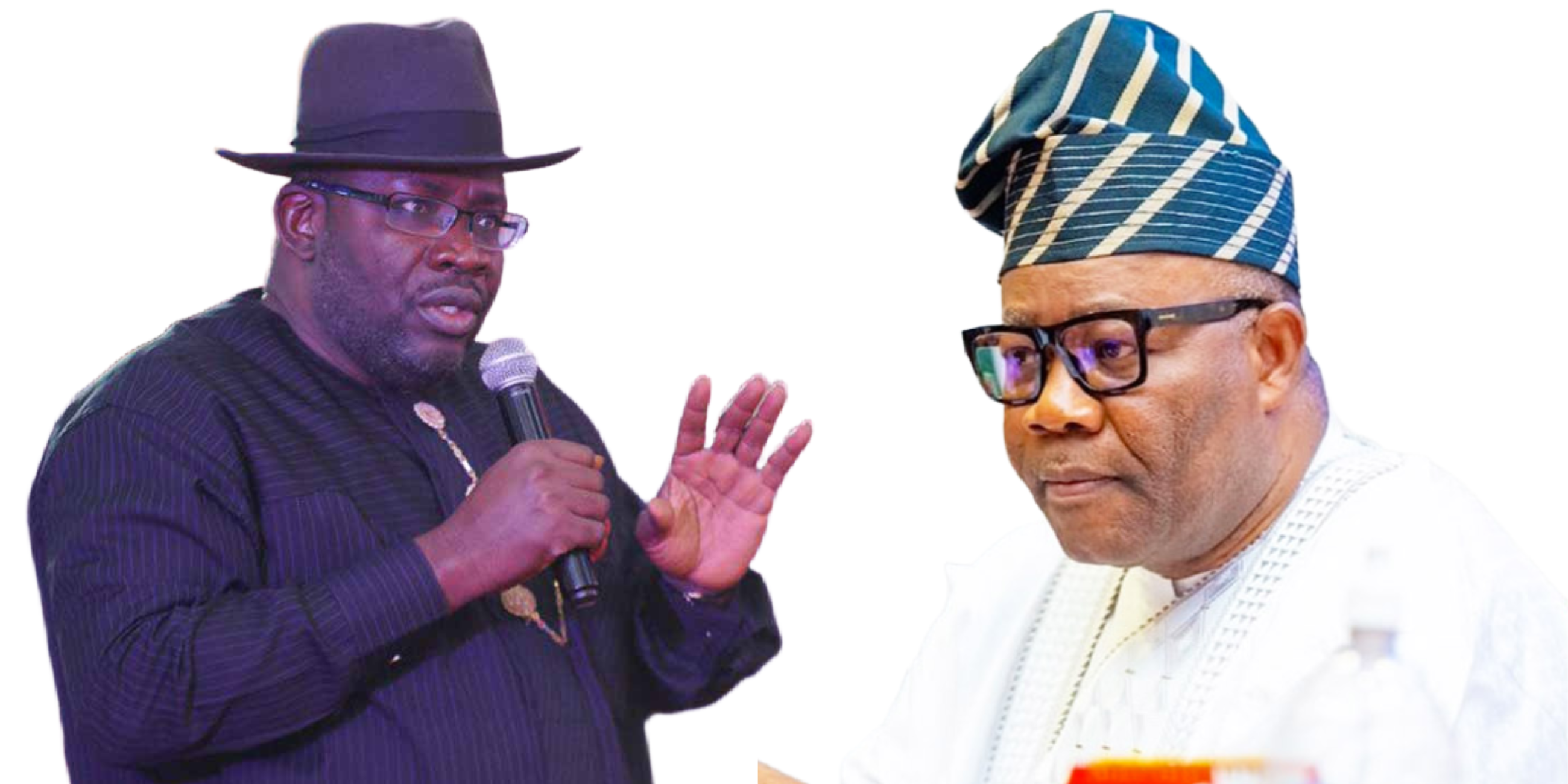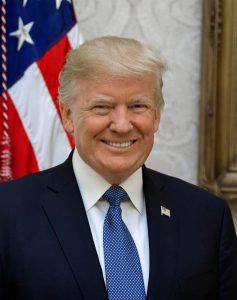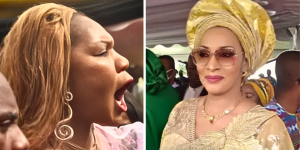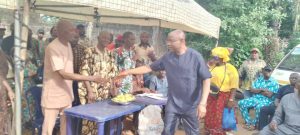Akpabio Tried To Silence Me For Opposing Tinubu’s Emergency Rule In Rivers – Seriake Dickson
Senator Seriake Dickson, representing Bayelsa West in the Nigerian Senate, has made serious allegations against Senate President Godswill Akpabio, accusing him of attempting to silence him for opposing President Bola Ahmed Tinubu’s request for a state of emergency in Rivers State. This accusation comes after a dramatic walkout led by Dickson and other senators on March 20, 2025, in protest against the approval of the emergency rule, which they viewed as unconstitutional and a violation of democratic principles.
The tension surrounding the approval of the state of emergency in Rivers State has been significant, with political figures and members of the Senate divided on the matter. Dickson, a former governor of Bayelsa State, has been an outspoken critic of the declaration, which he believes undermines constitutional processes and suspends the rights of elected officials in Rivers State. He and several other senators raised concerns during a closed session, arguing that the declaration did not meet the constitutional requirements and that the process was being rushed without adequate scrutiny.
On March 20, 2025, the Senate approved President Tinubu’s request for the emergency declaration in Rivers State through a voice vote. The vote, according to Dickson and other dissenting lawmakers, bypassed the constitutional requirement of a two-thirds majority, which is necessary for such significant decisions to be made in the Senate. This procedural oversight, Dickson argues, makes the approval unconstitutional and sets a dangerous precedent for governance in Nigeria.
Dickson’s objection to the decision was firm, and in protest, he led a walkout from the Senate chamber. This walkout, however, was not an isolated act; other senators, including Aminu Tambuwal and Enyinnaya Abaribe, also joined him in expressing their dissatisfaction with the emergency rule and the manner in which the vote was conducted. For Dickson, this walkout was a clear statement against what he described as an unconstitutional move by the Senate to approve the emergency rule without due process.
“I left the plenary before the Senate President was directed to report the outcome because I didn’t want to be present while what I opposed is being reported,” Dickson explained in his statement. He also noted that Senator Tambuwal, Senator Abaribe, and other like-minded senators left the session as well, underscoring the growing dissent within the Senate over the legality of the emergency declaration.
Dickson’s main issue with the approval of the state of emergency in Rivers State lies in its constitutionality. According to the Nigerian Constitution, the declaration of a state of emergency requires careful consideration and approval by the Senate, including a two-thirds majority vote. This requirement, Dickson insists, was not met during the voice vote held on March 20, 2025. He further explained that the state of emergency, particularly the suspension of elected officials in Rivers State, violated constitutional provisions designed to protect the democratic rights of the people.
In his statement, Dickson emphasized that while the Senate leadership and the president made efforts to modify the declaration to address some of the concerns raised by dissenting senators, these modifications were insufficient in addressing the core issue of constitutionality. “The beauty of democracy is such that the minority will have their say while the majority will have their way,” Dickson said, reflecting on the democratic process and the importance of ensuring that all opinions are heard, even if the final decision does not align with them.
The former governor also expressed disappointment at the lack of a thorough debate on the matter. He would have preferred a more open and robust discussion where the legal, constitutional, and political ramifications of the state of emergency could be fully aired. He indicated that the lack of a comprehensive debate and the rushed nature of the vote only contributed to the perception that the approval was a political maneuver rather than a carefully considered constitutional decision.
Adding to his critique of the Senate leadership, Dickson accused Senate President Godswill Akpabio of attempting to censor his contributions during the plenary session. Dickson claimed that Akpabio was unfair to him by misrepresenting his statements when he tried to raise a point of order for the Senate to go into an executive session. According to Dickson, he sought an executive session to allow for a more private and open discussion of the emergency declaration, particularly the aspects concerning the suspension of elected officials in Rivers State. However, he argued that Akpabio tried to silence him in the process.
“The Senate President was very unfair to me by trying to censor my freedom of expression,” Dickson said, expressing frustration with what he perceived as an attempt to stifle his right to speak out on a matter of national importance. For Dickson, the attempt to suppress his views reflected a broader problem with the functioning of the Senate under Akpabio’s leadership, where dissenting opinions were being suppressed in favor of a more centralized and controlled decision-making process.
Dickson’s accusations against Akpabio highlight the ongoing tensions between the Senate leadership and certain opposition members. These tensions, according to Dickson, undermine the principles of free speech and democratic debate, both of which are crucial for the proper functioning of a legislative body. In response to this perceived infringement on his right to speak, Dickson stated that he would seek a private meeting with Akpabio to formally express his displeasure and ensure that such incidents do not recur in the future.
Despite the challenges he faces in the Senate, Dickson remains committed to the idea of a participatory and vibrant democracy in Nigeria. He urged Nigerians, particularly his constituents in Bayelsa West, not to lose hope in the country’s democratic journey. While acknowledging the difficulties facing the nation, Dickson called on people of goodwill to rise up and work together to safeguard democracy and ensure that the principles of justice, fairness, and transparency are upheld.
“Our thoughts and prayers are with the people of Rivers State,” Dickson added, highlighting the human cost of the emergency declaration and the potential disruption it could cause to the lives of ordinary citizens in the state. He emphasized that the decision to suspend elected officials in Rivers State was not just a legal issue but also a moral and political one, as it could set a dangerous precedent for other states and future governments.
In this regard, Dickson’s words resonate as a call to action for Nigerians to remain vigilant and to demand accountability from their leaders. He underscored the importance of ensuring that the rights of citizens and elected officials are respected, and that any actions taken by the government are in line with the provisions of the Nigerian Constitution.
The approval of the state of emergency in Rivers State has sparked widespread debate, not only within the Senate but also among political commentators, legal experts, and the general public. Critics have raised questions about the legality of the emergency rule, particularly the suspension of elected officials, and many expect that the matter will be taken to the judiciary for resolution. Dickson, in his statement, hinted that the legal challenges to the emergency declaration would be forthcoming, and that the ball was now in the court of other branches of government to address the constitutional issues raised by dissenting senators.
This ongoing legal and political battle could have significant ramifications for the future of governance in Nigeria, especially in terms of the limits of executive power and the role of the legislature in overseeing the actions of the president. The situation in Rivers State may well become a test case for how far the government can go in declaring states of emergency and suspending elected officials, and whether such actions can withstand judicial scrutiny.
Senator Seriake Dickson’s strong opposition to the state of emergency in Rivers State, and his subsequent walkout from the Senate, underscore the deepening divisions within the Nigerian political landscape. His allegations against Senate President Godswill Akpabio for attempting to silence his dissent further highlight the challenges facing the Senate in terms of fostering a healthy, open, and democratic debate on critical national issues.
Dickson’s stance, backed by other opposition lawmakers like Senator Aminu Tambuwal and Senator Enyinnaya Abaribe, signals a larger resistance to what they view as an unconstitutional use of executive power to override the will of the people, especially in a state like Rivers, where democratic processes are being undermined.
As the legal and political fallout continues to unfold, the decision on the Rivers state of emergency remains a key issue in Nigerian politics. Whether the judiciary will intervene to correct what many see as constitutional violations will be crucial in determining the future trajectory of the nation’s democracy. For now, Dickson’s call for vigilance and commitment to democratic principles resonates as a crucial message to Nigerians navigating these tumultuous political waters.
Source: SR





